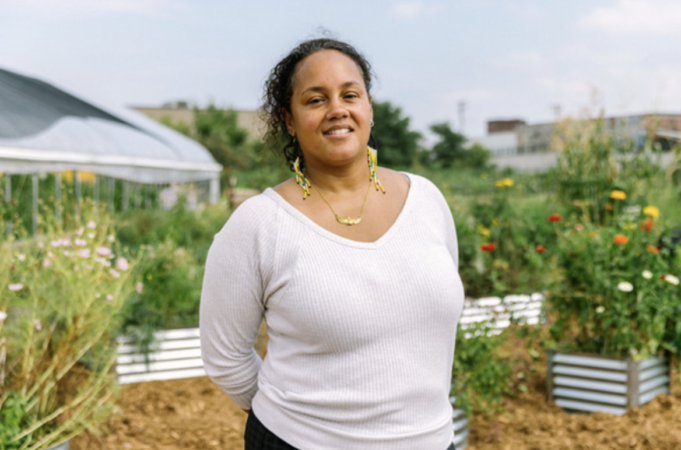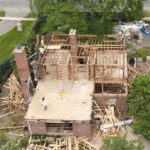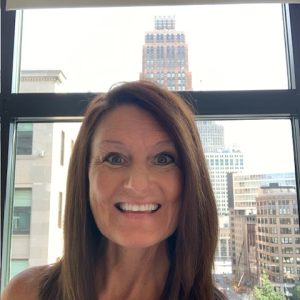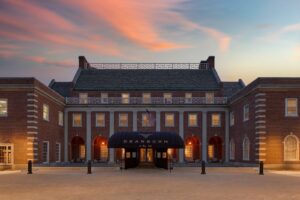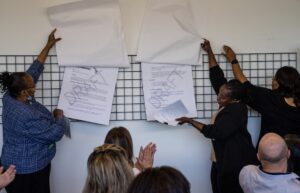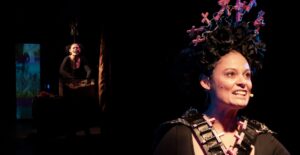Detroit’s sustainability journey is still young, but it is already reshaping how the city thinks about land, infrastructure, and community. At the center of this work is Tepfirah Rushdan, Detroit’s Director of Sustainability, who leads the city’s Office of Sustainability with a focus on climate resilience, equity, and community-driven solutions.
Rushdan, who has a long history in grassroots organizing and food equity, emphasizes that Detroit’s path forward must reflect the lived experiences and priorities of its residents. As the city prepares to showcase its efforts at the Sustainable Urban Design Summit, she spoke with Detroitisit about what sustainability means for Detroit today — and what opportunities lie ahead. Register to SUDS on Nov, 6, 2025, to listen to her speak on the topics she resonates with the most – sustainable community impact.
REGISTER FOR SUSTAINABLE URBAN DESIGN SUMMIT 2025 , NOV, 6 AT NEWLAB DETROIT HERE.
Detroitisit: Detroit has set bold goals around sustainability. How would you describe the city’s overarching vision, and what principles guide your work?
Rushdan: Our office is guided by Detroit’s Climate Strategy and Sustainability Action Agenda, and both documents are grounded in community input. Residents actually lobbied to get an Office of Sustainability inside City Hall, so the fact that we exist is because of them. That keeps us accountable — our actions are guided by what the community says it needs, alongside tangible outcomes set by the mayor.
Detroitisit: You often say “resilience builds the future.” What does that mean in Detroit’s context?
Rushdan: On a practical level, it means supporting the creation of resilience hubs across Detroit — places where residents can access resources during weather events or other disruptions. Climate change is impacting everyone, and resilience means both mitigation and adaptation. It’s also about strong social networks. For me personally, food equity is central to resilience. If people can access healthy food in their neighborhoods, that strengthens communities against larger systemic challenges.
Detroitisit: Where do you see the most promising opportunities for sustainability innovation right now?
Rushdan: I think about innovation in two realms. First, the technology side — things like reducing the energy burden in buildings, which a lot of our startups at Newlab are working on. Then there’s what I’d call natural tech, which is using the land itself. Detroit has so much vacant land that many describe us as a potential carbon sink. We can use that land to sequester carbon, restore ecosystems, and rethink how urban space functions.
Detroitisit: Can you share an example of Detroit turning a sustainability challenge into an opportunity?
Rushdan: One of the most exciting projects right now is Detroit Solar Neighborhoods. We’re taking land that was previously blighted and converting it into sites for clean energy. That energy can then be used to power other buildings. It’s a project that combines sustainability with land reuse and shows how challenges like vacancy can actually become opportunities.
Detroitisit: Resident voices seem to be central to your approach. How is Detroit weaving lived experiences into sustainability planning?
Rushdan: That is the cornerstone of everything we do. This office exists because the community petitioned for it. We never want to operate in a way that ignores that history — especially in Detroit, where government decisions have sometimes caused harm. For us, it’s about being in touch with residents before we do the work, co-developing plans, and letting them lead in many cases. If we don’t build trust, we won’t succeed.
Detroitisit: The Student Sustainable Solutions Showcase is launching this year at SUDS. Why is it important to bring students into this work?
Rushdan: In any sector, but especially in sustainability, it’s critical to involve young people early. They bring new ideas, new energy, and fresh perspectives to challenges we’ve been working on for years. I always treat it as a two-way street: I want to learn from them while also passing the baton. Cultivating a new generation of leaders who aren’t afraid to challenge systems is a big part of this work.
Detroitisit: What skills or mindsets will the next generation of leaders need most?
Rushdan: Listening is number one. A lot of our problems already have solutions within the community, but it takes a keen ear to hear them instead of coming in thinking we have all the answers. Coalition-building and collaboration are also critical. No one sector can do this work alone.
Detroitisit: Looking ahead 10 or 20 years, what is your vision for how sustainability reshapes Detroit?
Rushdan: I see Detroit redefining what it means to be a former rust belt city. The Motor City can become a place that treats land as an asset and uplifts ecosystems alongside business and community interests. Vacant land, collapsing industries — many people see those as challenges. I see them as opportunities to show other cities how to rebuild in a more sustainable way.
My vision is a balance — a Detroit where business thrives, communities are strong, and natural systems are integrated into daily life. We have a chance to rethink how cities operate, and I want Detroit to be a model for how to turn adversity into innovation.
Detroitisit: If you could leave one piece of guidance for others building sustainability strategies, what would it be?
Rushdan: Don’t underestimate the power of listening. Communities often know what they need — our job is to hear them, collaborate with them, and make sure solutions are built together. That’s the only way this work will last.
As always, be sure to subscribe to our newsletter for regular updates on all things Detroit.


